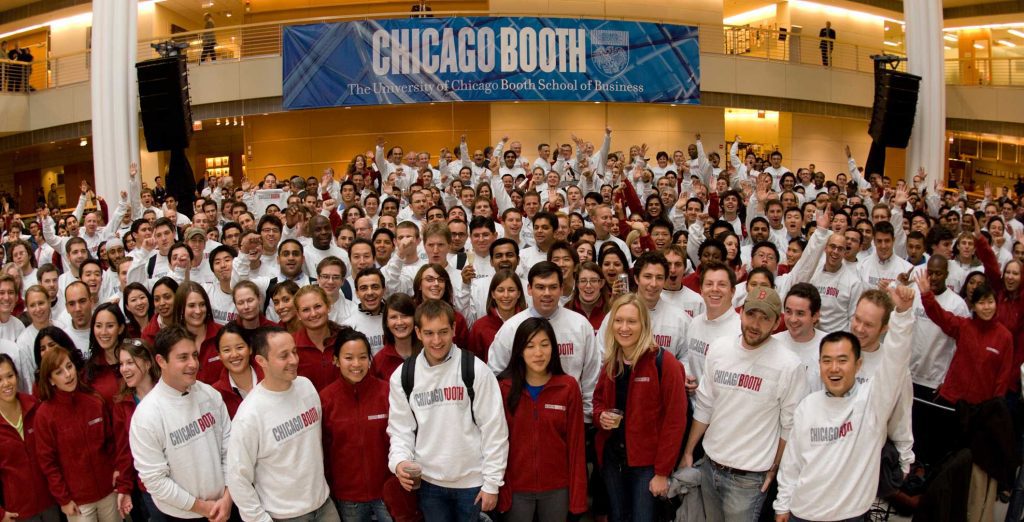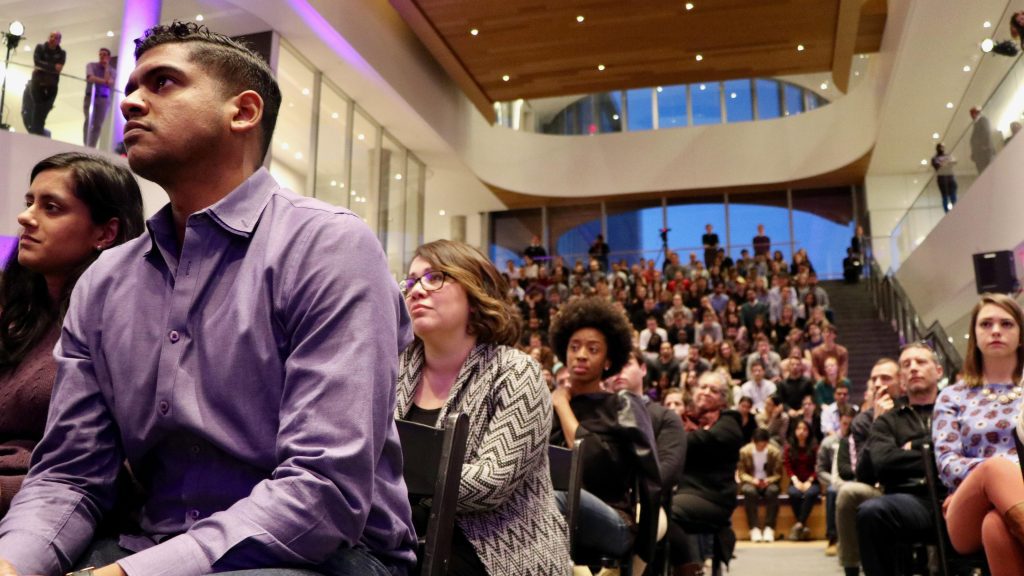Chicago Booth, Michigan Rise in New U.S. News Business School Ranking

The new, official U.S. News & World Report ranking of the best business schools in the United States has been released, with some minor shake-ups at the top. For the second year in a row, Harvard Business School remains tied for the first overall in the ranking. However, the University of Chicago Booth School of Business officially supplanted The Wharton School at the University of Pennsylvania, which fell back from its tie at the top to third overall.
The rest of the top ten, as we previously mentioned, largely resembled last year’s U.S. News release, except for the inclusion of the Ross School of Business at the University of Michigan and the exclusion of the Yale School of Management. Surprisingly, Michigan Ross may have made the strongest showing in the newest ranking, not only managing a position in the top 10, but landing tied for seventh overall—ahead of Columbia Business School and the Dartmouth Tuck School of Business. The Yale School of Management slipped to a tie at 11th overall with Duke University’s Fuqua School of Business.
U.S. News & World Report 2019 Best Business School Rankings
| Rank | School |
|---|---|
| 1st (Tied) | Harvard Business School |
| 1st (Tied) | University of Chicago Booth School of Business |
| 3rd | The Wharton School at the University of Pennsylvania |
| 4th | Stanford GSB |
| 5th | MIT Sloan School of Management |
| 6th | Northwestern University Kellogg School of Management |
| 7th (Tied) | University of Michigan Stephen M. Ross Business School |
| 7th (Tied) | UC Berkeley Haas School of Business |
| 9th | Columbia Business School |
| 10th | Dartmouth College Tuck School of Business |
Chicago Booth, Michigan Shine Among Rising Full-Time MBA Programs

For the first time in school history, the Booth School of Business secured its place atop of the U.S. News ranking (albeit tied with HBS). In a statement, Booth Dean Madhav Rajan noted, “We are pleased to be recognized in this manner, and gratified that the recognition is across the board. We continue to strive to be the pre-eminent academic school of business.”
After its place among the top ten business schools was revealed, Michigan Ross Dean of Business Scott DeRue stated in a release, “We are excited to once again be ranked among the top 10 MBA programs in the country by U.S. News & World Report. This recognition is a testament to the extraordinary talent at Michigan Ross, our innovations in action-based learning, our partnerships with leading companies across the globe, and the most supportive alumni community in the world. We are developing leaders who have the character and capabilities to transform the world through business, and it’s an honor to be recognized among the very best in the world.”
On its website, the school also proudly boasted that, outside of Stanford GSB, no business school in the ranking earned more top ten placements in specialty areas, earning high grades for: “Accounting (No. 4), Entrepreneurship (No. 7), Finance (No. 10), International (No. 5), Management (No. 3), Marketing (No. 4), Non-Profit (No. 5), Productions/Operations (No. 3), and Supply Chain (No. 6).”
Outside of the top ten, the USC Marshall School of Business watched its stock rise again this year. Two years ago, U.S. News handed USC Marshall the 31st spot on its best business school ranking, which jumped to 24th last year, and 20th this year. Just a few spots back of USC was the Jones Graduate School of Business at Rice University, which saw the largest leap of any of the top 25 schools—jumping six spots from the previous year.
Nine schools among the top 100 in the new rankings managed to jump at least ten spots, including three MetroMBA favorites: the Whitman School of Management at Syracuse University, the Neeley School of Business at TCU, and the Fordham School of Business at Fordham University. Whitman, in fact, tied for second highest rise, improving 18 spots overall from last year’s 88th overall placement to 70th this year. No school improved more, however, than the Weatherhead School of Management at Case Western Reserve University in Cleveland, Ohio, which improved a remarkable 22 spots from last year’s 77th overall placement to 55th this year.

The Syracuse University Whitman School of Management jumped 18 spots in the most recent U.S. News “Best Business Schools” ranking.
A handful of schools also secured a spot in the top 100 after not appearing at all the previous year, including the Howard University School of Business, the American University Kogod School of Business, and Argyros School of Business and Economics at Chapman University.
Which Schools Fell The Hardest?
Along with the Yale School of Management losing its prestigious top ten status, a handful of schools tumbled in the 2019 ranking—with some virtually flat-lining. No school fell more than the Poole College of Management at North Carolina State University, slipping an astounding 35 spots from 55th last year to 92nd this year. Eleven schools lost their top 100 status in total. The reasoning behind the sudden drops are likely linked to the publication’s change in how it ranks the business schools.
In regards to the ranking methodology, U.S. News placed less value in test scores and student GPA. In a release this afternoon, U.S. News reported the following:
“For the first time U.S. News reduced the value of reported GPA, GRE and GMAT scores for full-time and part-time MBA programs and GRE scores in the education rankings if less than 50 percent of an entering class submitted these scores. U.S. News believes this lack of data means the scores are not representative of the entire class.”
The change, arguably, could stem from the fallout of the Temple University Fox School of Business, which was knocked off all of the publication’s rankings for the 2018 calendar year because of falsely reported data regarding test scores.
Stay tuned to MetroMBA on all the biggest MBA ranking news.
The Best Business Schools for Landing Top Consulting Jobs

Clear Admit recently explored which business schools help prepare MBAs the most for a career in consulting, which you can read below.
With starting salaries in the $140,000 to $150,000 range and a customary $25,000 signing bonus on top of that, it’s no wonder so many business school students target the prestige consulting firms known as the “MBB”—McKinsey & Company, Boston Consulting Group (BCG), and Bain & Company—as their post-MBA landing pads. That $170,000+ annual compensation package can quickly cut any MBA loan debt you may have taken on down to size.
Indeed, management consulting has been one of the most coveted career paths for fresh MBA grads for ages. And though the technology industry has in recent years been stealing some grads from the consulting industry’s traditional slice of the pie, the most recent MBA employment reports reveal that consulting is already making a comeback against tech at certain schools.
The opportunity to work with a range of clients comprised of many of the world’s most celebrated businesses across industries—tech included—is part of the appeal of consulting. In many ways, a top consulting gig allows MBA grads to continue their management education while getting paid for it—and further honing their skills and expertise by helping solve a wide variety of business challenges. And, not for nothing, breaking into the MBB is a highly competitive pursuit—one that almost assures that your colleagues will be smart, driven people you’ll get a lot out of working with.
Finally, where the top consulting firms are choosing to find their talent reflects on the quality of the education those schools’ students are getting. In many ways, the hiring practices of the MBB can serve as a gold star standard of sorts for MBA programs.
Elite Firms Hire Grads from Elite Business Schools
The crème de la crème of leading business school talent has headed toward the top consulting firms for decades—and performed well there—creating a virtuous circle of sorts in which the firms’ appetite for such talent only grows. And while this piece focuses on MBB, we should note that a host of other consulting firms—Deloitte, A.T. Kearney, Accenture, Strategy&, and Oliver Wyman among others—are also highly prized post-MBA destinations.
If you are looking to see which business schools send the greatest percentage of their graduates into consulting overall, don’t miss our September 2017 analysis of leading consulting industry feeder schools. Which schools top the list? And what stands out about how these schools successfully train students for careers in consulting?
Looking at Class of 2016 graduates, the University of Virginia’s Darden School led the pack, with 38 percent of its graduates heading into consulting. Columbia Business School was next, sending 35 percent, followed closely by Northwestern University’s Kellogg School of Management, which sent 33 percent.
The 2017 employment reports, which have been released since our analysis last fall, show some shifts year over year. Darden tied with Emory’s Goizueta School of Business in terms of the percentage of Class of 2017 grads who headed into consulting, with each school sending 34 percent. Close on their heels were Columbia, Duke’s Fuqua School of Business, Northwestern’s Kellogg School of Management, and Dartmouth’s Tuck School. All four sent 33 percent of their most recent graduating class off to consulting firms.
2 Non-U.S. Schools Lead All Others in Consulting-Bound ’17 MBA Grads
But year after year, one thing remains the same. INSEAD, with campuses in France, Singapore, and Abu Dhabi, beats all leading U.S. business schools when it comes to consulting. INSEAD’s 2016 MBA employment report, detailing employment outcomes for December 2015 and July 2016 INSEAD grads, shows that 46 percent went into consulting. And the most recent figures reveal that almost a full half—49 percent—of the 1,029 students who completed the INSEAD MBA program in December 2016 and July 2017 chose to either enter or return to the consulting field.

We should note here that INSEAD is distinct from many other schools in that it includes sponsored students who are returning to their pre-MBA employers among its hiring stats. This is in contrast to many U.S. schools, where the reported number and percentage of students hired by sector and employer corresponds to those students actively seeking employment, excluding sponsored students. Of the 49 percent of INSEAD 2017 grads headed into consulting, 33 percent were new hires and the remaining 16 percent were returnees.
London Business School (LBS) was the runner-up for the Class of 2017, sending 41 percent of grads into consulting. This was a 6 percentage-point gain over the school’s previous class of MBA graduates. Like INSEAD, LBS’s reported sector designation and top employer information includes sponsored students, only its employment report does not disclose what percentage of the class those returning students represent.
UT Austin Opens New Business School Building, and More – Houston News

Let’s take a look some of the biggest business school news coming out of Houston business schools this week.
New Rowling Hall is Future of Business Education at UT Austin – McCombs Newsroom
The McCombs School of Business at the University of Texas at Austin recently celebrated the opening of its new 497,500-square-foot graduate business facility, Robert B. Rowling Hall. The new building will be home to the school’s MBA and M.S. in Technology Commercialization programs, the Jon Brumley Texas Venture Labs, the John C. Goff Labs, and the Center for Leadership and Ethics.
“Rowling Hall will enrich the individual journeys and experiences of each student who learns here,” said Gregory L. Fenves, president of the university. “This magnificent building is a testament to the vision of Robert and Terry Rowling, and their belief in the power of a UT education, which propelled the project from the beginning.”
You can learn more about Rowling Hall here.
Bauer Lecturer Named Educator of the Year – Bauer News Center
Dan Ramey, a lecturer for the University of Houston Bauer College of Business’ Department of Accountancy & Taxation, is the first-ever recipient of the Educator of the Year Award. Presented by the Greater Houston Area Chapter of the Association of Certified Fraud Examiners, Ramey was recognized for his contributions to anti-fraud education within his college and university.
“It is an honor and privilege to be able to work with such a great group of faculty, staff, and students,” Ramey said. “Teaching the two classes is the highlight of my week. I love being a part of the students as they go out into the business world, and I sincerely hope that I am successfully preparing them, academically and professionally, to succeed in accounting and business.”
You can read more about Ramey and the Award here.
Mays to Celebrate EY as 2018 Corporate Partner of the Year – Mays Impacts
The Mays Business School has named EY its Corporate Partner of the Year, and announced March 22 as EY Corporate Day at the Mays Business School. One of the leading employers of Mays graduates, EY (formerly Ernst & Young) is one of the largest professional services firms in the world, and part of the “Big Four” accounting firms.

“When selecting this year’s honoree, EY came quickly to mind because of their reciprocal partnership with the school,” said Mays Dean Eli Jones. “Not only do they provide financial support and devote their time to our students, they also groom our graduates for management positions. It is a cycle of success.”
For more information about the events planned that day, you can contact Cindy Billington or visit here.
Joe Biden Talks Industrialization, Income Inequality at Northwestern Kellogg

On March 9th, an eager audience gathered at Northwestern University’s Kellogg School of Management to hear what wisdom Joe Biden might have to impart from his distinguished political career to the world of business.
Speaking the day after observations of International Women’s Day around the world, the former vice president opened his talk with with a message about inclusion. He cautioned the crowd that “in order for a country to succeed… it has to husband all its assets. It cannot leave half its initiative, half its brain power, half of its courage, half of its capability, half of its strive behind.”
Although it was only a preface, the call for gender equality set the tone for the rest of the speech. The overarching theme, in Biden’s words, was inequity. And he didn’t just discuss the wage gap; he focused on what he called “geographic inequity,” or the rising inequality between various American cities and towns.
For much of his time at the podium, Biden decried the recent fate of industrial America, and of the middle class. He gave a bleak description of once-thriving Midwest towns and cities: “It’s called depression,” he said. “Empty factories, empty storefronts, empty homes, empty wallets. And the underpinnings of this geographic inequity are no mystery. It’s been in the making for years. States, and state laws, have undercut organized labor and the right to bargain, stunting the movement. The labor movement has been hollowed out and good, middle class jobs have been lost.”
Biden went on to discuss the disparity between cities on the coasts and those in the Midwest, saying that “a poor child in San Francisco has twice the chance of making a top income than one born in Detroit or Wilmington or Saginaw.”
He concluded that this is due to the fact that “they come from less segregated communities. There’s less income inequity, allowing them to see success around them. Their school systems are better funded. Social networks are stronger. More people are taking part in their communities.”
The talk was framed by current political issues, and the general solution that Biden gave spoke directly to the audience, comprised of MBA students and faculty. The major takeaway of the speech was that business leaders—those who will go on to shape the economy and, to some extent, policy—have a social responsibility.
He emphasized the importance of work, not just for economic stability, but as a source of identity. Biden recounted his father telling him, “Joey, you gotta remember a job’s about a lot more than a paycheck. It’s about your dignity, it’s about your respect, it’s about your place in your community. I mean this literally, not figuratively.”
As an example, he brought up causal links between unemployment and other social ills. For instance, he added that “every one percent increase in unemployment raises opiod deaths in a community by four percent.”
For Biden, the social obligation to push for fair wages and workers’ rights is not just about raising morale. Rather, it is central to the spirit of capitalism. The role that the business community must play in this scenario, according to Biden, is to push back against policies that limit workers’ rights.

Students at Northwestern Kellogg during the Biden speaking event. Photo via Evan Garcia / Chicago Tonight
Making sure that workers earn wages that match their productivity is a necessary part of a healthy economy. And, by extension, a healthy economy produces and furthers a healthy society.
Biden identified a few common business practices that he described as both anti-labor and anti-competition. He posed a rhetorical question to the audience: “The capitalist system, I thought—and I’m a capitalist—is all about being able to compete and bargain. So how do you justify non-poaching agreements to prevent one franchise from hiring away workers from another franchise?”
He added, “How do you justify taking hourly wage-earners, not managers at all, and re-classifying them, denying them in 1.2 billion dollars in wages, to go to shareholders. Where’s that bargaining deal? Where’s that capitalist competition?”
While Biden’s expertise and experience do not lie in business, he did highlight the importance of responsible business practices in a stable and equitable society. And perhaps, ultimately, that is the most valuable insight that he can provide to MBA students—a unique vision about business that tries to examine its role in the rest of the social world, along with profit and productivity.
This article has been edited and republished with permissions from our sister site, Clear Admit.
What Are The 5 Highest Paying Consulting Firms in the World?

“Is this going to be worth it?”
If you are currently or have ever considered earning an MBA degree, it’s likely that you’ve asked yourself this question. Given the burgeoning cost of tuition—especially for top business programs—plus the loss in income and cost of living while pursuing your education, it’s a fair question to ask. Does it make sense to invest this sort of money into your education with no guaranteed result?
Of course, many of the benefits of earning an MBA simply can’t be quantified and boiled down to raw numbers. The new opportunities created through study abroad or case competitions, the expansion of your professional network and chance to connect with industry professionals. All of these considerations can make it difficult to ever truly gain perspective on an MBA degree’s worth.
Thankfully, there are some areas where the numbers still do the talking. In particular: post-graduate salary. This is one of the easiest and simplest ways to see the true value of an MBA. And it’s not just helpful to look at the increase in salary after earning an MBA—it can be just as enlightening to see the difference in post-graduate salary for various MBA concentrations. This data can help you make important choices about what kind of path you’d like to pursue while earning your MBA, and how to make the most out of the time and money spent on your education.
U.S. News & World Report found found that strategy, while one of the least popular MBA concentrations (chosen by just 4.3 percent of business school students), led to some of the highest paying jobs after graduation. Since students concentrating in strategy typically go into jobs at consulting firms following graduation, they are more likely to earn high salaries that can help increase the overall value of their degree—not to mention pay off their student loans much faster.
For students looking to increase the worth of their MBA with a high-paying job in consulting, we’ve rounded up the highest paying firms in the consulting industry. Working towards careers in these top companies will guarantee that the answer to “is this going to be worth it?” will always be “yes!”
The 5 Highest Paying Consulting Firms

Formerly known as Ernst & Young, EY-Parthenon is one of the top paying consulting firms for MBA graduates. The company is headquartered in London, England, with more than 250,000 employees at offices throughout the world. EY is known as one of the “Big Four” accounting firms, joining Deloitte, PwC, and KPMG as the four largest professional services networks in the world. Last year, EY was also named 29th on the “100 Best Companies to Work For” list from Fortune.
According to Business Insider, EY-Parthenon employees with just an undergraduate degree make up to, on average, $110,000 annually, including base salary, signing bonuses, and extra incentives. Management Consulted data found that MBA grads earned an astounding base salary of $170,000 at the company. That figure doesn’t include signing bonuses, relocation expenses, and more.

Founded in 1926 by University of Chicago economics professor James McKinsey, McKinsey & Company has transformed into one of the world’s most iconic consulting empires. The company has opened in more than 120 global cities, employing more than 14,000 consultants—many of which comes from prestigious MBA institutions.
According to Management Consulted data, McKinsey & Company is the second-highest paying consulting firm in the world for MBA grads, with offered base salaries coming in at $152,000. With an added potential performance bonus of $35,000, those figures can rise to $187,500 in just one year.

Strategy& has grown exceedingly since its beginnings as Booz & Company in 1914. One of the top global strategy consulting firms in the country, the company now has 57 offices throughout the world, revenue upwards of $1.3 billion, and 3,000 employees. Nearly a century after their founding, in 2013, the company was acquired by PricewaterhouseCoopers (PwC) and officially renamed to Strategy&.
The company comes in third overall among for annual base compensation for MBA grads, at a lofty $152,000. The company also offers one of the most unique and lucrative retirement funding options for consulting employees, with 6 percent of base salary and bonuses matched for its 401k plan.

L.E.K. is technically the youngest company to make the top five, which was founded in the early 1980s by former Bain partners James Lawrence, Iain Evans, and Richard Koch. Headquartered in both Boston and London, L.E.K. is also the smallest company on this list, with around 3,000 employees.
Despite its size and relative newness in comparison to many of the other companies on this list, L.E.K. pays its employees more-than-handsomely, offering a tempting base salary of $150,000 and upwards of $25,000 in performance-based potential incentives.

Bain & Company, headquartered in Boston, Massachusetts, is a global management consultancy firm providing advice for public, private, and non-profit organizations. Along with the Boston Consulting Group and McKinsey & Company, Bain & Company is one of the “Big Three” firms. Founded in 1973, Bain & Co. today has more than 8,000 employees throughout the world and an estimated revenue between $3.7 and $4.5 billion.
Bain offers its recently employed MBA grads a starting base salary comes in slightly above aforementioned Deloitte employees, snagging $148,000 per year, which can grow to $185,000 in total compensation.
Honorable Mentions

The Boston Consulting Group, founded in 1963, now has more than 90 offices in 50 countries, advising clients throughout the private, public, and not-profit sectors.
The Massachusetts institution offers its MBA graduates right around the same compensation as Bain & Co, the companies unofficial direct competitor. Base salaries come in around $147,000, but massive (and we mean massive) bonus incentives can bring that total up to $191,100.

Another one of the “Big Four,” Deloitte has witnessed non-stop growth since its founding in 1845. Today, the firm makes more than $38.8 billion USD in revenue with roughly 263,900 employees throughout the world. As of 2016, Deloitte was ranked as the sixth largest privately owned organization in the U.S. The firm’s offerings span across audit, tax, consulting, financial advisory, and enterprise risk services, with offices across the world in cities like Los Angeles, Tokyo, Madrid, Tel Aviv, and many more.
Management Consulted data found that MBA grads at Deloitte reported a base salary slightly smaller than its aforementioned contemporaries, pulling in $140,000 per year. Deloitte separates itself from its competition by offering returning interns a potential to pay for the send year of their MBA education in the form of reimbursement.
What MBAs Should Know About BMO Financial

BMO Financial Group, established in 1817 as Bank of Montreal, is one of the largest diversified financial service providers in North America. According to BMO, more than 45,000 employees serve the financial needs of more than 12 million customers. Continue reading…
